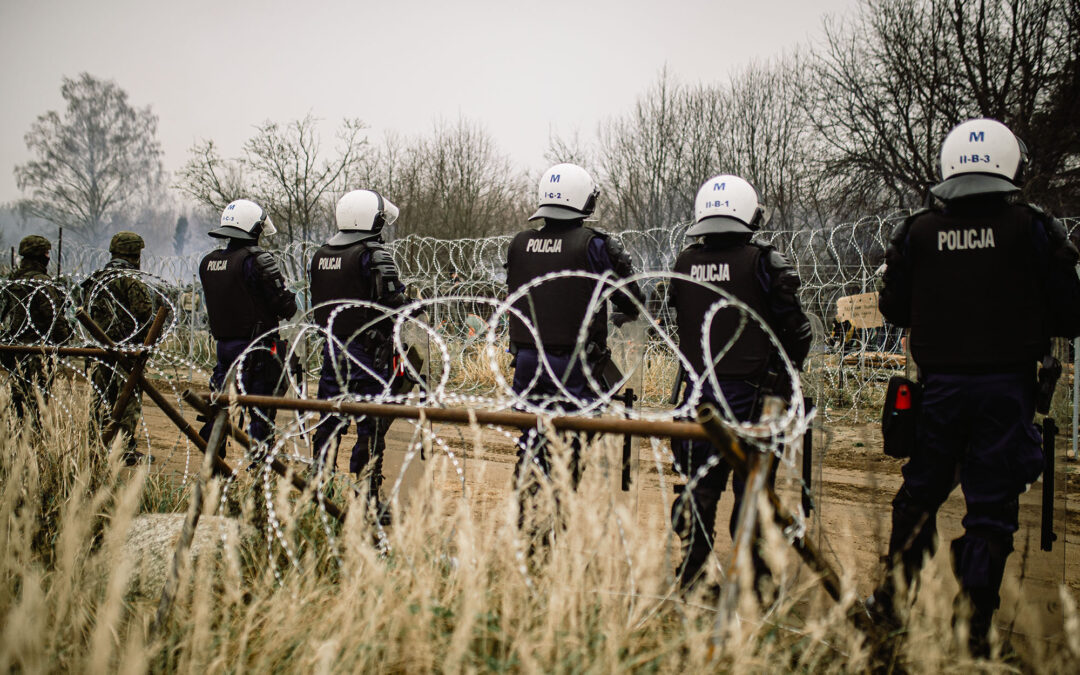Poland’s defence minister has ordered the construction of a razor-wire barrier on the border with the Russian exclave of Kaliningrad to prevent the Kremlin from using it as a pathway to send Middle Eastern migrants and asylum seekers into the European Union.
“I have decided to take actions that will strengthen the security on the Polish border with the Kaliningrad Oblast by sealing this border,” announced Mariusz Błaszczak this morning.
“The temporary barrier will consist of three rows of razor wire, 3 metres wide and 2.5 metres high…[and] devices for electronic surveillance,” added the minister. “We are starting work immediately, today.”
Wicepremier @mblaszczak poinformował dziś, że na granicy 🇵🇱 z obwodem kaliningradzkim powstanie zapora, która wzmocni ochronę granicy państwa. W jej budowę są zaangażowani żołnierze #WojskoPolskie z jednostek inżynieryjno-saperskich.
–
📄 https://t.co/2x5NRDwxuS pic.twitter.com/X6tbBpJLGU— Ministerstwo Obrony Narodowej 🇵🇱 (@MON_GOV_PL) November 2, 2022
The decision follows recent speculation that additional flights are being launched from the Middle East and North Africa to Kaliningrad, notes RMF24. That has raised fears of orchestrated efforts to encourage people to illegally cross the border, as has been happening from Belarus since last year.
Błaszczak, who also serves as deputy prime minister, noted that the construction of a wall on the Belarus border – which began in January and was completed in the summer – “saved our country from the flood of migrants”.
“Polish soldiers have the appropriate experience: they protected the Polish-Belarusian border and I am convinced that they will also protect the border with the Kaliningrad Oblast,” continued the minister.
He added – repeating previous claims by the Polish government – that the wave of attempted crossings from Belarus was “a plan written in the Kremlin, the aim of which was to destabilise Poland, so as to prevent support for Ukraine. First, they wanted to destabilise Poland, then they attacked Ukraine”.
Błaszczak also called on the domestic opposition not to hinder the government’s attempts to secure the Kaliningrad border. Last year, some opposition politicians criticised the treatment of those seeking to cross from Belarus, with Polish authorities preventing their entry and even pushing some back over the border.
The government, however, argued that it had a duty to prevent illegal crossings and said that its efforts were stopping the entry of potentially dangerous individuals, including some with terrorist links.
“Last year, the opposition and celebrities tried to force border guards and soldiers to open the border so that migrants could cross borders illegally,” said Błaszczak today.
“I hope that this time they will not organise trips to the border, will not put pressure on Polish soldiers and border guards, and will not harass soldiers,” he added. “We will see how the opposition will behave; [but] regardless of this, our task is to ensure the security of Poland,” he added.
In response to Błaszczak’s announcement, President Andrzej Duda’s chief of staff, Paweł Szrot, told the Polish Press Agency (PAP) that the president “supports all initiatives that lead to an increase in the security of Poland and its citizens”.
“The increase in air traffic between Kaliningrad and the countries of the Middle East makes it necessary to think about this risk,” Szrot added.
Main image credit: Irek Dorozanski / DWOT (under CC BY-NC-ND 2.0)

Daniel Tilles is editor-in-chief of Notes from Poland. He has written on Polish affairs for a wide range of publications, including Foreign Policy, POLITICO Europe, EUobserver and Dziennik Gazeta Prawna.




















